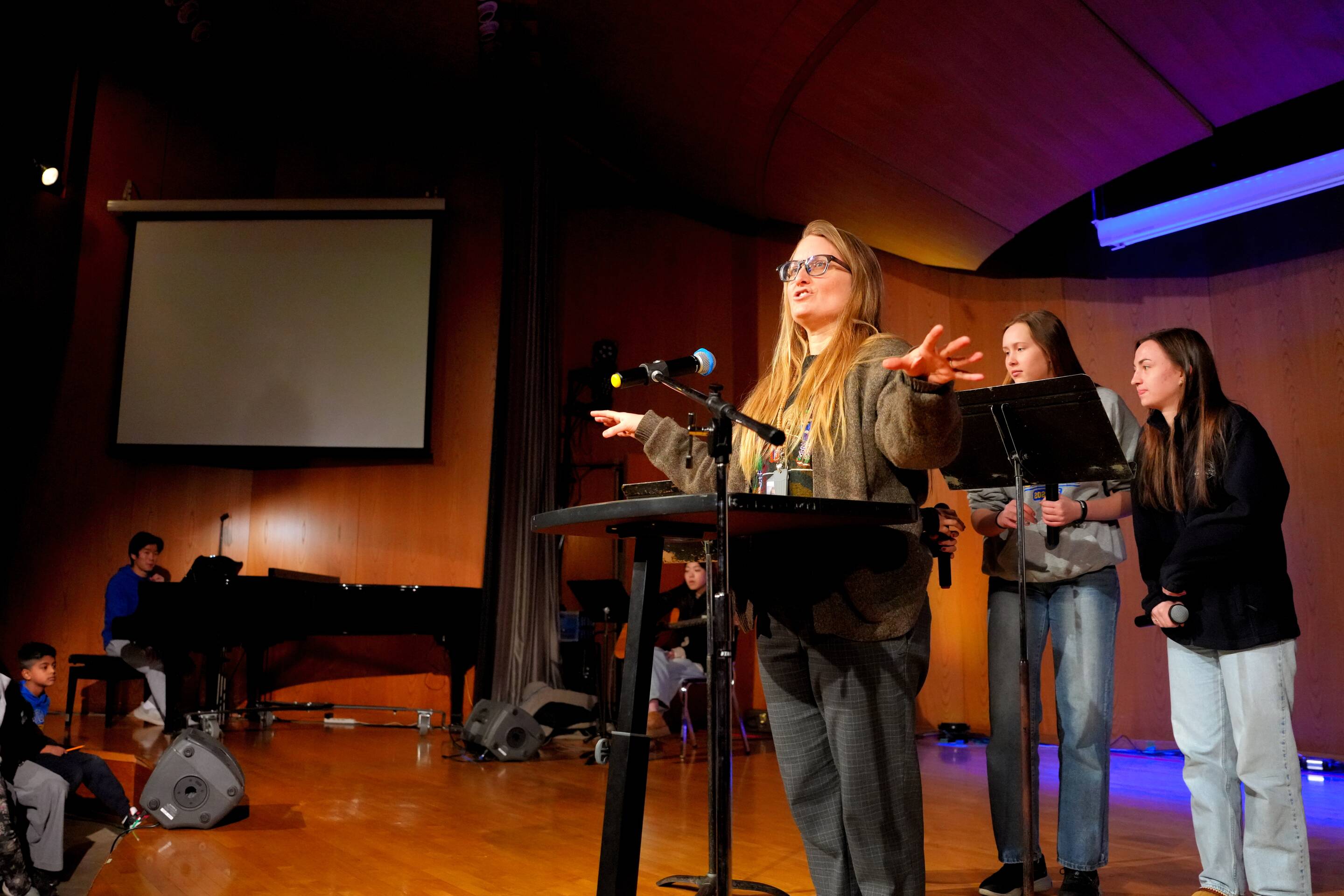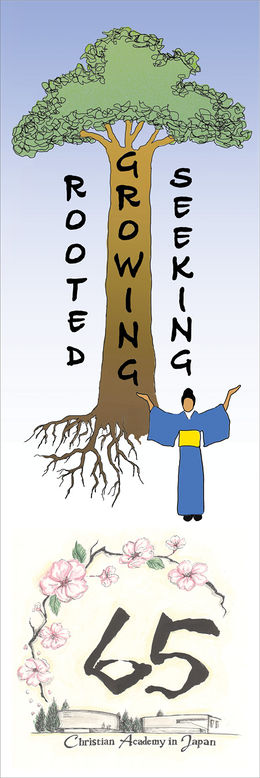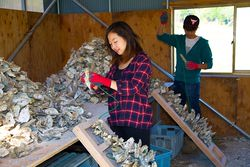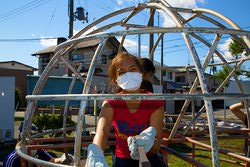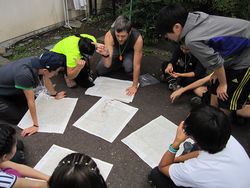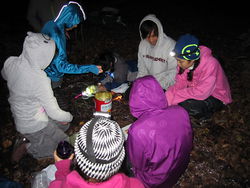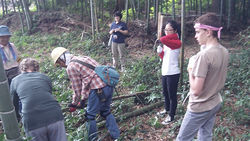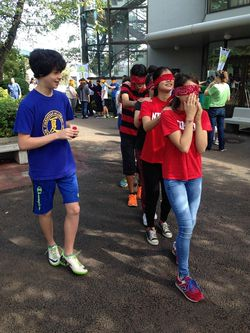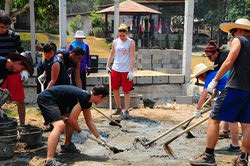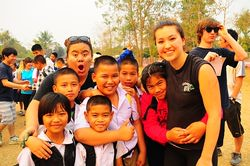At CAJ (Head of School blog) School Without Walls - October 2014
School WithOut Walls[edit]
Higher order skills like leadership, collaboration, problem solving, and learned resiliency are what educational futurists and business leaders are saying are now essential for future success for both individuals and societies. For most of a week in October we get high school students out of the classroom to engage in activities designed to develop and encourage just such skills. We call the program SWOW (school without walls) and this month I have asked some of the leaders share about this exciting program.
リーダーシップ、コラボレーション(恊働)、問題解決、強靭な回復を身につける、というような高度のスキルは、将来、個人または社会が成功するために必要不可欠なスキルだと、教育学者やビジネスリーダーたちが言っています。10月は、ほぼ一週間を使い、SWOW(school without walls - 壁のない学校)というプログラムを行っています。高校生たちをクラスルームから連れ出して、上に述べたようなスキルを啓発するためのアクティビティを行うためです。今月はリーダーの方々にこのすばらしいプログラムのことをお話してもらうようにお願いしました。
Anda Foxwell: Overall Program[edit]
SWOW is one way we equip students to impact the world for Christ through providing authentic opportunities to practice each of our student objectives. Students who are skilled at being servant leaders will make an impact following the example of Jesus, rather than in ways that would dominate or abuse. Students must have a strong knowledge base, be effective thinkers and problem solvers, know how to communicate and collaborate with others, and appreciate and care for the world God has created.
Anda Foxwell: 12th Grade[edit]
The seniors have two opportunities for School Without Walls, the first during School Without Walls week, the second in March when they visit Thailand. During October SWOW, students learn more about the history and culture of Japan, this land in which God has placed them. Through visits to historical sites, they experience firsthand how Japan has come to be the way it is, and to grow in their appreciation of its heritage and cultural legacy. Even more importantly, students have opportunities to put their love into action through service projects that put them together with communities still recovering from the 2011 earthquake and tsunami. Students refurbished playground equipment in a park doubling as a temporary housing area. They scraped paint, primed, and repainted the equipment in brilliant primary colors, providing an attractive area for local children to play. They cleared dirt, turning it, sifting it, and leveling it to provide a back yard and garden for a small community center. They worked together with hoya (sea pineapple) fishermen in an effort to revitalize this part of the local economy. In each effort, they worked together with local missionaries who can provide follow-up with these endeavors.
Ryan Potter: 11th Grade[edit]
Wilderness Camp seems similar enough to CAJ's longstanding junior “Stress Camp” on the surface, but it doesn’t take much investigation to realize that much more than the name has changed. “Stress Camp” was started in the late 1970’s as a way to help students learn survival skills and teach them to overcome obstacles. A number of years ago CAJ started to build a connected program for developing leadership and problem solving skills. Changes were made to the hiking program to better fit the new objectives. Hiking and camping in the wilderness certainly does provide the perfect backdrop for some fantastic lessons in servant leadership, communication, teamwork, and trust. Thus the focus began to change–although orienteering, building shelter, and hiking are still components of the program, the stress of the survival skills has been intentionally and significantly reduced. This allows time for debriefing, team initiatives, and group bonding, as well as to allow energy reserves for the mental effort of offering and receiving feedback on leadership. The goal is to provide real leadership opportunities by which students can practice and develop servant leadership, enabling them to positively impact CAJ and the communities in which they are citizens. Students practice this by taking turns leading the group in pairs, with opportunities at the end of each day for the leaders to talk about the challenges of leadership, and for the followers to offer encouragement or suggestions to the leaders. Paralleling this, teachers lead the group in exercises and discussions throughout the day that are focused around building upon a daily theme, with support, examples and challenges from Scripture.
Kim Essenburg: 10th Grade[edit]
Groups of students working together to solve a logic problem, studying servant leadership in the book of Philippians, and role playing various parties involved in an industrial waste accident—these are some of the activities 10th graders do at school on the first day of SWOW. Sophomore SWOW focuses on biological communities and human communities as students move outside of the normal classroom to learn about God’s world and how to effectively care for it with hearts of loving service for God and for people. They explore the essential questions How can I be an effective servant leader? What do I learn about God through studying His creation? What is wrong with the world? How can I make a difference? After a day of special activities on campus, they travel to Lake Yamanaka at the foot of Mount Fuji where they spend 2 nights as they continue their learning by working together in cabin groups to cook, clean up, have devotions, build a fire, and negotiate issues like 12 girls and one shower. During the day students take a guided hike, learning about the area’s flora and fauna, visit an aquarium specializing in the freshwater fish of the local lakes, are challenged by some more team building exercises, and bike around Lake Yamanaka. One student said, “I learned to think about the group I was leading—who was in it and how I could help them."
9th Grade[edit]
The grade 9 students don't do an overnight trip, but they do have a special out-of-the-classroom curriculum for SWOW. They participate in a series of group activities designed to teach leadership, collaboration and awareness. They analyze several movies for their leadership lessons and spend time in reflection and discussion. And this year, for the first time, they went on a day long hike (rescheduled because of the typoon day) and participated in a well organized service day with local organizations.
Anda Foxwell: 12th Grade in Thailand[edit]
In Thailand, seniors continue the SWOW lessons as they take the lessons beyond the borders of CAJ and Japan out into a developing area of the world. They participate in many leadership lessons in practical ways, and undertake a construction project that will provide for improved opportunities for hill-tribe school children.
主にある僕として、
バンダーハック・ブライアン
